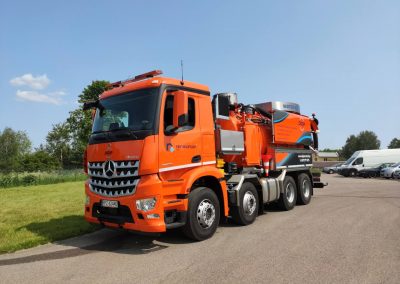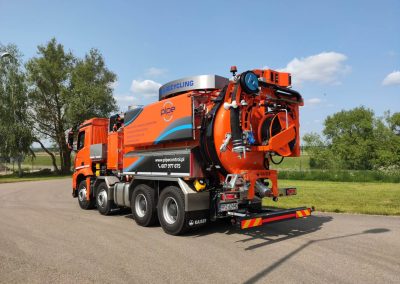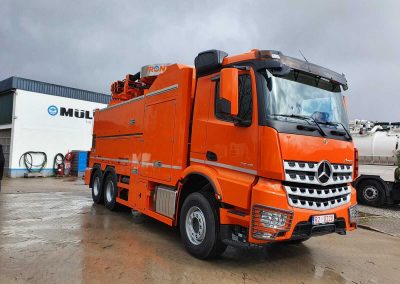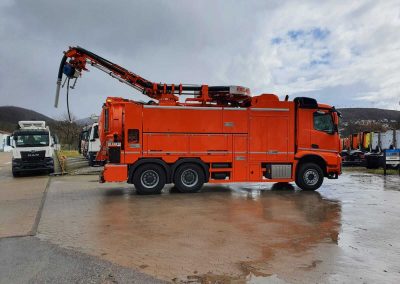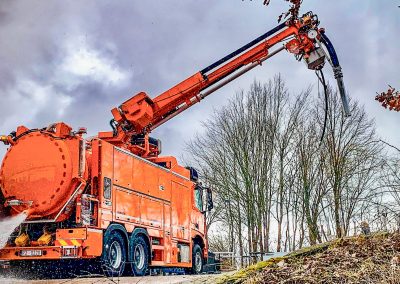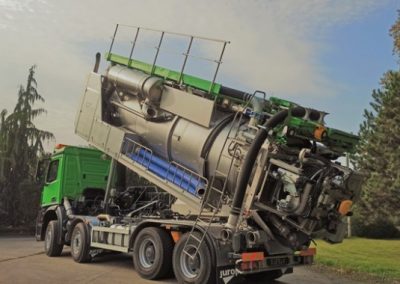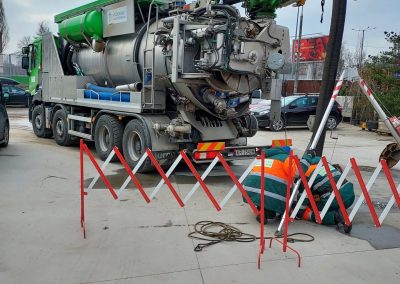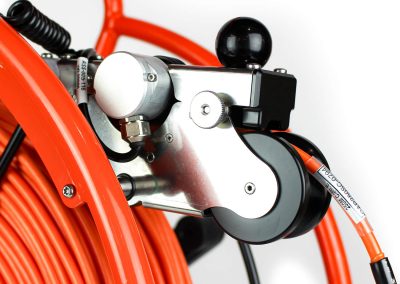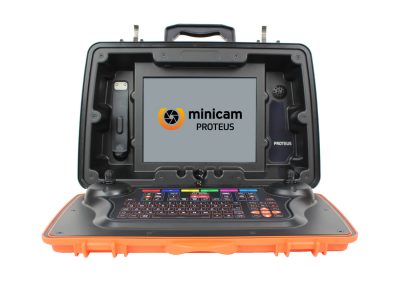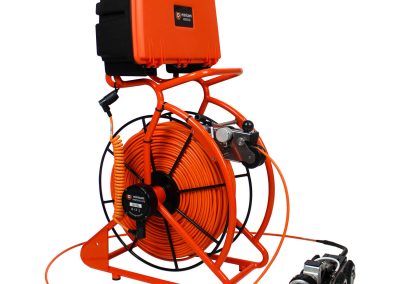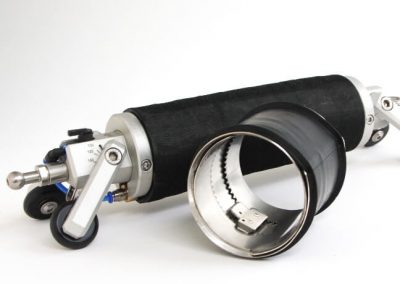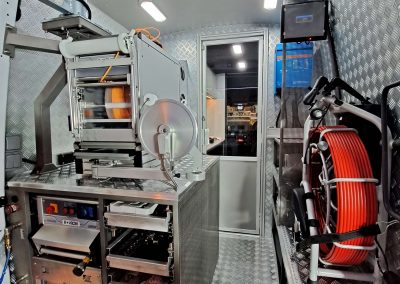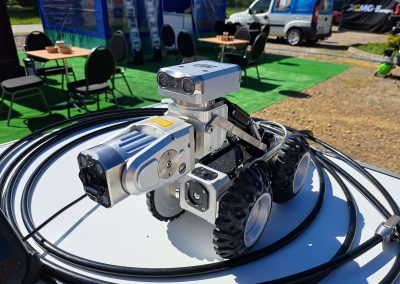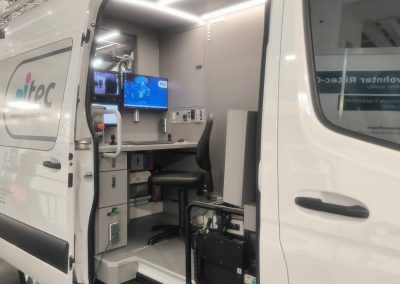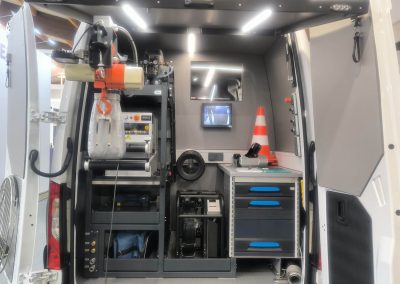Conference Agenda
*The programme may still be subject to slight modifications.
- CLEANING OF DRAINS AND OPERATION OF PRESSURE TANKERS
- MONITORING AND INSPECTION OF SEWAGE NETWORKS
- HDD NAVIGATION SYSTEM
- USE OF AI IN ENGINEERING
The proper functioning of sewerage systems is crucial for sanitary safety, environmental protection and the well-being of residents. One of the most common operational challenges is blockages and deposits, which not only impede the flow of wastewater, but can lead to serious infrastructure failures. This is why it is so important to understand the principles of sewer networks and methods for their effective cleaning. In the theoretical part of the training, participants will gain a solid knowledge base, which will become the foundation for the effective application of practical techniques: High-pressure suction and flushing trucks: Accessory selection: For years, the Waterworks of the City of Krakow S.A. has been responsible for the proper functioning of one of the largest sewerage systems in Poland. The complexity and extent of this network requires the use of modern solutions, regular inspections and effective methods of maintaining the patency of the sewerage system. Selected issues: Participants will learn about the basic design elements and operating principle of modern suction and flushing trucks. Special attention will be paid to technical aspects, operating and retrofitting options, as well as technical innovations in the latest versions of the equipment: Orangery Orangery, Granary Attendees will have the opportunity to see equipment and pressure trucks in action, as well as talk to experienced operators and company representatives. What's more, there will be an opportunity to see for yourself how the equipment on display works - a great opportunity to gain valuable knowledge, exchange experiences and make new contacts. Direct contact with the technology and practical testing of the equipment will translate into real knowledge and skills for use in everyday work. The state-of-the-art KAISER AQUASTAR IV sewer cleaning and drain cleaning vehicle with water recovery is known as the “emperor of performance”. It is mounted on a MERCEDES BENZ AROCS 8x4/4 chassis, and is equipped with, among other things, suction and pressure pumps with 300-metre-long hoses, waste and drinking water chambers, an advanced water recovery system and a remote control panel to improve work and increase operator safety. Participants will not only be able to look at the operation of this equipment, but will also be able to test its capabilities for themselves in conditions similar to everyday operation. Wodociągi Miasta Krakowa S.A. is one of the most experienced and modern water and sewage companies in the country. The company is not only responsible for the operation and maintenance of its extensive sewerage network, but also has its own fleet of specialised pressure vehicles, which enable the network to be cleaned effectively and safely in a variety of terrain and technical conditions. WMK consistently invests in technological innovation and the development of operational teams. Selected issues: Krakow Reymana Street WORKSHOPS AND TRAINING ON SEWER CLEANING AND PRESSURE TRUCK OPERATION
10:00 - 13:00
Theoretical part
Other selected issues
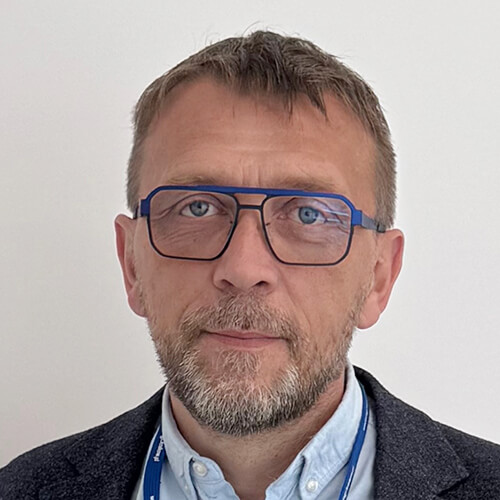
Krzysztof Kulik
Sewer cleaning from the investor's point of view
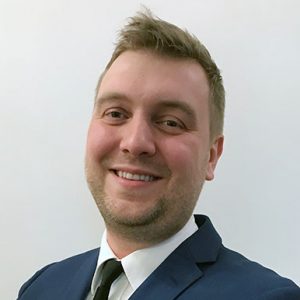
Szczekarewicz Stanislaw
Theoretical lecture on drain cleaning
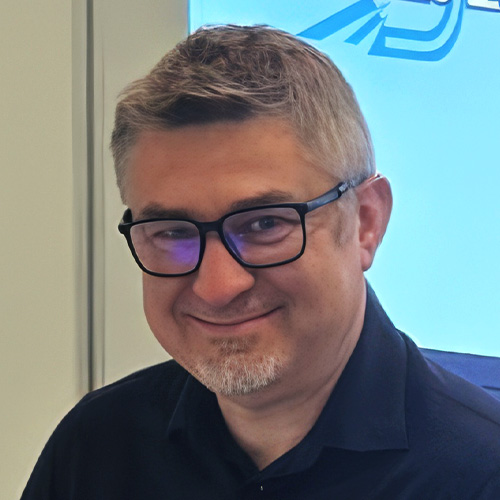
Adam Żelażewski
High-pressure suction and flushing trucks. The latest equipment solutions
13:00 - 14:00
Lunch break
14:00 - 14:30
Transport by bus to the practical part of the workshop at Reymana Street
14:30 - 17:00
Practical part
Other issues

Adam Żelażewski
‘Emperor of efficiency’ - pressure truck demonstration

Marcin Kandziora
Advanced control technology - pressure truck demonstration
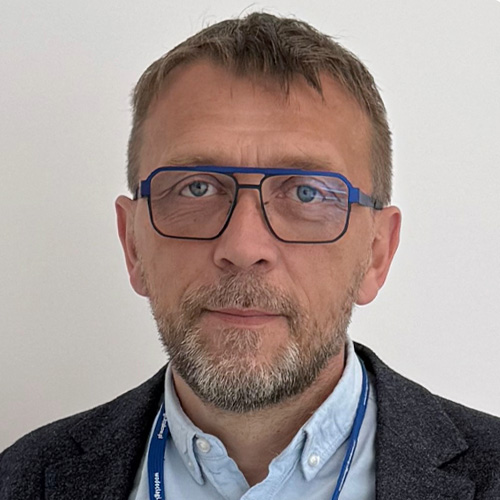
Krzysztof Kulik
Pressure truck operation - investor experience and lessons learned
Today, TV inspection is one of the key tools in the maintenance and diagnosis of the technical condition of sewer networks. This presentation will introduce the basics of this technology. The introduction will allow participants to understand the importance of CCTV inspection in everyday practice and prepare the ground for the more advanced topics covered later in the workshop. ELSE plays a key role in providing advanced technology for monitoring and inspection of sewer networks. As an authorised partner of the renowned German company IBAK, it provides water and sewerage companies with access to state-of-the-art solutions for the diagnosis, monitoring and management of underground infrastructure. Working closely with IBAK, ELSE offers not only innovative equipment, but also comprehensive technical support and specialised training for operators and operating companies. ELSE regularly presents the latest IBAK hardware solutions at numerous presentations, demonstrations and industry events. RAFNAR represents the recognised British manufacturer MINI-CAM- on the Polish market as its exclusive distributor. Its activities focus on providing specialised solutions for assessing the technical condition of sewer networks. The company plays a key role in promoting innovative inspection tools, combining high quality Mini-Cam equipment with expert technical and service support. KanRo Ltd is a Polish company specialising in the sale and service of sewer inspection equipment. It is the exclusive representative of the German company Ritec, a manufacturer of advanced cameras and systems for remote inspection of pipes, sewers and manholes. Thanks to this cooperation, KanRo offers high quality inspection solutions to the Polish market while providing technical support. Orangery The practical part of the training will provide an excellent opportunity to see the real-life application of the technologies discussed earlier. Participants will get an up-close look at how TV inspection of sewers works in practice. Different types of equipment will be presented - along with a discussion of their use depending on the type of network and field conditions. Participants will also learn the process of documenting defects and anomalies detected, as well as how to prepare inspection reports in accordance with current standards. The aim of this part of the training is not only to demonstrate the technical capabilities of the equipment used, but above all to provide a better understanding of the day-to-day work of sewer inspection specialists.
State-of-the-art Full HD inspection system for sewers from DN100aThe Full HD inspection system for sewers from DN100 upwards allows sewers to be inspected from the level of the main sewer. It consists of several specialised trolleys and cameras, and is complemented by a portable push-pull kit that allows accurate inspection in hard-to-reach areas. During the meeting, attendees will have the opportunity to experience different equipment configurations and a modern walk-through body powered by powerful lithium-ion batteries. During the demonstration, the full canal inspection process will be presented - from the preparation and introduction of the equipment to the final analysis of the video footage. Participants will be able to see for themselves the high quality of the recorded video, familiarise themselves with the available measurement options and see what a comprehensive canal condition assessment looks like in practice. The operation of the Ipeka Rovion HD inspection system - in both ride-on and push-pull versions - and the state-of-the-art Quickview 360 tool will be demonstrated. The system records 360° video, is supported by the WinCanMobile app and synchronises with the WinCanWeb platform. Quickview 360 provides a full 360° recording and a two-dimensional layout of the 3D inspection data, which significantly speeds up and facilitates the assessment of the technical condition of the channels. Also on show will be a mobile sewer manhole inspection system, equipped with, among other things, an integrated laser distance sensor, a quick-mount camera-on-a-stick mechanism and a function for reconstructing manhole geometry in 3D. In addition, the stand will feature Quick-Lock ties, used for spot repairs without trenching. Ritec is a recognised manufacturer of specialised sewer inspection equipment. The cameras are characterised by high image quality, durability and innovative technical solutions that facilitate work in difficult conditions. The presentation will provide an opportunity to learn about the latest models and functionalities that can significantly improve diagnostics and, consequently, network maintenance. This is an excellent opportunity to learn about the practical applications of the equipment and get answers from experts. Krakow Reymana Street WORKSHOPS AND TRAINING FOR INSPECTION CAMERA OPERATORS
10:00 - 13:00
Theoretical part
Issues
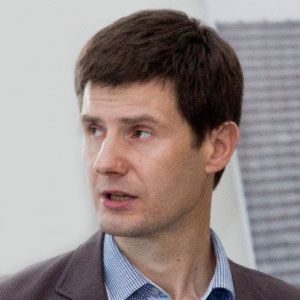
Dr.-Ing. Bogdan Przybyła
Introduction to TV inspection in sewers
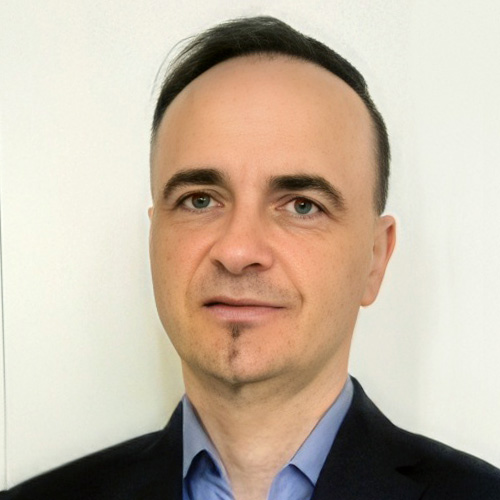
Krzysztof Jabłonowski
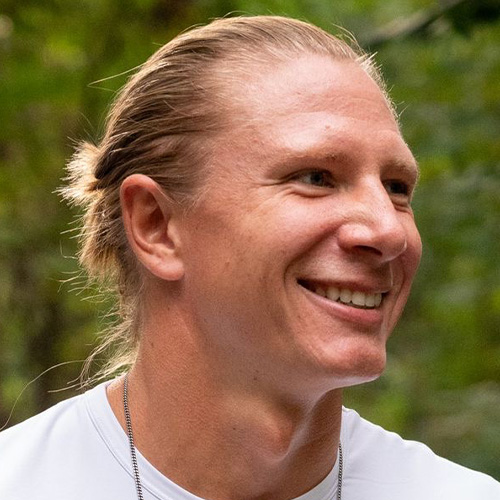
Tomasz Piekart
The latest developments from IBAK
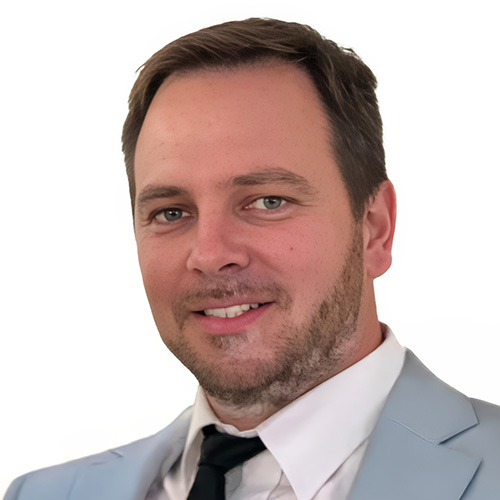
Jan Przybyła
The latest solutions from MINI-CAM
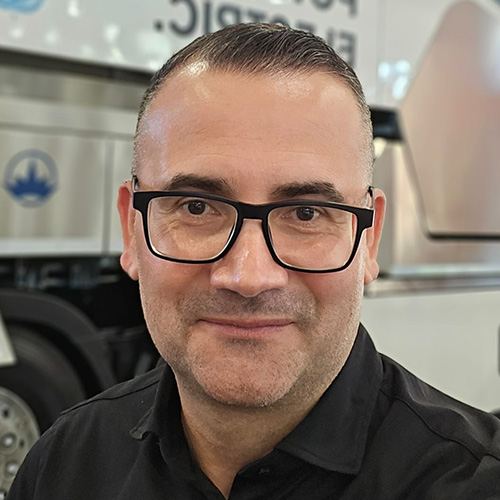
Przemysław Sójkowski
Ritec's latest solutions
13:00 - 14:00
Lunch break
14:00 - 14:30
Transport by bus to the practical part of the workshop at Reymana Street in Krakow
14:30 - 17:00
Practical part
Issues:

Krzysztof Jabłonowski

Tomasz Piekart
State-of-the-art inspection system in Full HD quality for canals from DN100 and above

Jan Przybyła
Proteus Light mobile kit with CRP140 trolley with new MCU312 control system for DN 150-600

Speaker
How do IPEK cameras help detect problems in the network?

Przemysław Sójkowski
Ritec camera capabilities in action
WORKSHOP AND TRAINING ON MAGNETIC SYSTEM NAVIGATION IN HDD
Theoretical workshop:
– Introduction to HDD navigation
– Basics of navigation systems
– Types of navigation systems
– Construction and function of navigation equipment
– Drill route planning
– Influence of external factors and geology on navigation
– Technical capacity of individual systems
– Presentation of the x-system
– System y presentation
– System presentation z
– The most common errors in navigation
Practical training:
– Demonstration of x, y, z systems under field conditions
– Configuration and calibration of equipment
– Discussion of techniques for working with the systems
– Presentation of individual systems
– Simulation of typical difficulties and how to solve them
– Interpretation of erroneous readings and course correction
– Analysis of results and summary
– Exchange of experience and case studies
Artificial intelligence in engineering practice
1. Introduction to artificial intelligence
- What artificial intelligence is and how it works in practice
- Language models (LLM) – basics of ChatGPT, DeepSeek, Claude and other language models
- What are prompts and how to create them effectively
- correct construction of prompts
- is prompting so important and why?
- What are AI agents and AI workflows? Why is this the future of AI development?
2. application of AI in daily office and management work
- Using language models as daily support
- Automation of document and correspondence creation
- Creation of summaries, notes and reports
- Generation of offer content, project descriptions and responses to enquiries
3. AI in engineering data analysis – examples from the market
- Analysis of numerical data, graphs and images
- Pattern recognition (e.g. defect and anomaly detection)
- Prediction and forecasting (e.g. material consumption, risk of failure)
- Process optimisation (e.g. production planning, design topology)
4. Security, privacy and good practices
- How to use AI tools responsibly
- Limitations of AI technology and associated risks
5. practical part – ChatGPT exercises (all you need is a phone with internet access to take part in the exercise)
- Work with real examples from the industry
- Creation of prompts tailored to the needs of participants
- Discussion of results and joint optimisation
6. Possibility to discuss with the trainer and ask questions after the training is over
19:00 – 23:00
Barbecue feast
Granary
9:00 – 12:10
Trenchless Construction session
Preliminary presentation plan: The paper will describe conditions for the implementation of gas transmission pipeline networks using microtunnel technology in sections crossing terrain obstacles trenchless. Guidelines for the installation of steel drill pipes on w/c for long and short microtunnels will be presented, together with requirements for the installation of steel pipes in casing pipes. Recommended technologies for the implementation of short crossings under obstructions for pipes up to 500 mm in diameter will also be discussed. The presentation will discuss the latest developments based on digitisation and automation as well as technical solutions that have a real impact on ecology, comfort and simplicity of use, precision and safety when working with trenchless technologies. Today, in an era of intense energy and climate transition, low-environmental impact technologies are becoming the cornerstone of modern linear infrastructure. Trenchless methods such as HDD or Direct Pipe allow underground networks to be constructed with minimal interference with the landscape, soil and natural habitats. Nevertheless, their use in practice is sometimes limited by rigid and ambiguous legal frameworks. The following issues will be addressed during the discussion:
Paweł Kośmider
Opening of the conference

Maciej Płoński
Application of trenchless technology at Warsaw Waterworks - experience from completed investments and future plans.
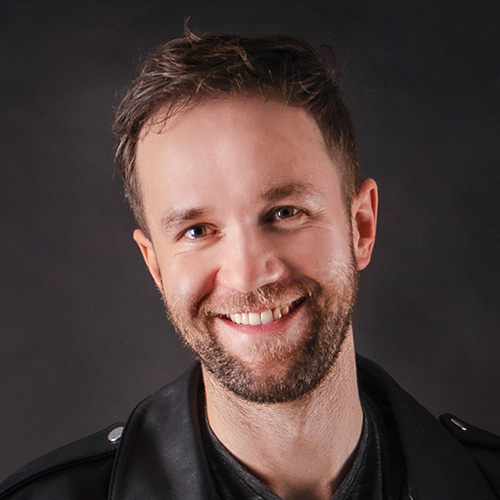
Dominik Kordjaka
Modern Katowice underground - efficient replacement of water pipes using trenchless technology
– brief information on water supply infrastructure in Katowice
– trenchless technology in construction of water supply network in Katowice
– statistics - scale of operation
– examples of realisations in Katowice
– innovations and the future
– Quiz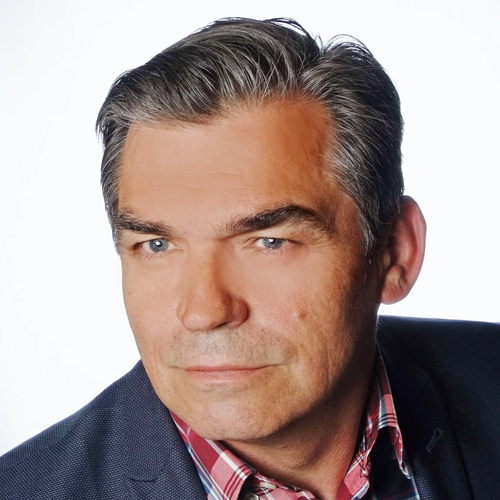
Roland Kośka
Microtunnel technology - solutions dedicated to the construction of underground crossings for gas transmission pipelines
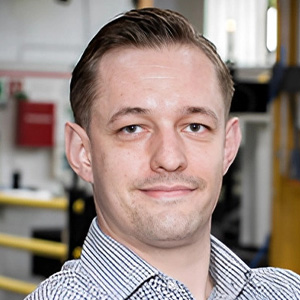
Filip Slavtchev
Innovations in directional drilling technology - solutions for the future from TRACTO
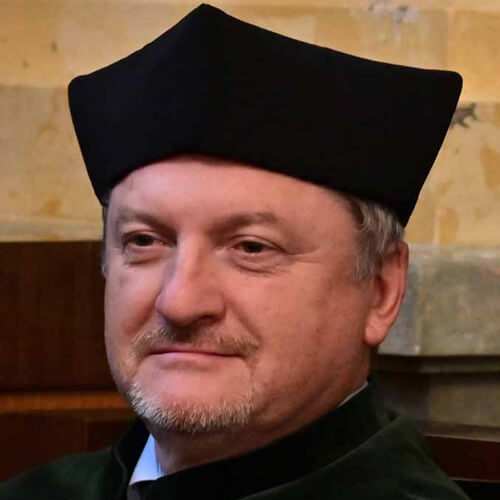
Dr.- Ing. Jan Ziaja, Professor at the AGH University of Science and Technology
Environmental directives - a barrier or an opportunity for the development of low-invasive trenchless technology
The aim of this study was to identify and analyse the legal and environmental barriers to the use of trenchless technologies in areas of natural value - especially Natura 2000, peatlands and river valleys. Selected EU legislation was analysed, including the Habitats Directive (92/43/EEC), the Water Framework Directive (2000/60/EC), the EIA Directive (2011/92/EU), the Taxonomic Regulation (EU 2020/852) and the Nature Restoration Law (2023/2195). Clashes between records (EIA - Environmental Impact Assessment) and actual environmental impacts of selected technologies were also analysed.
The work identified the need for dedicated environmental guidelines for trenchless technologies and their formal recognition as preferred techniques for linear projects, among others. It was also proposed to start work on their inclusion in the BAT (Best Available Techniques) system, which could be a breakthrough in the decision-making process for environmentally sensitive infrastructure investments. 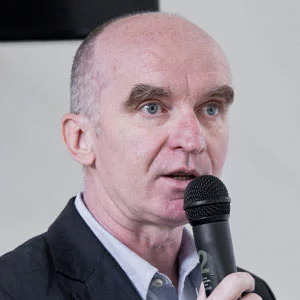
Robert Osikowicz
DISCUSSION PANEL: Progress and innovation in trenchless construction techniques
Orangery
12:10 – 12:30
Coffee break
Panorama
12:30 – 14:45
Trenchless Renovation session
Tests carried out directly on objects or in laboratories on samples taken are the basis for assessing their technical condition. At present, a number of testing methods are available on the Polish market that enable a reliable assessment of the structure, including the material from which it is made. The paper will present the possibilities of using the observation method and digital twins during the implementation of trenchless techniques and the operation of underground critical infrastructure. The assumptions of the idea of digital twins and an evaluation of the possibilities of their use over the last several years will be discussed. The principles of the observation method for the realisation of linear structures will be presented and the evaluation from CAD (2D drawings) to the Digital Twin. A method will be discussed which can be used to integrate the geometry of the facility, the condition assessments and the monitoring results of the underground infrastructure and its surroundings in order to ensure the safety of the installation and to determine the optimum time to start repairs or upgrades. This is particularly important in urban areas with time-varying loads and changes in soil and water conditions, as well as in areas of mining damage. The lack of technical documentation for underground infrastructure facilities is a common issue faced by all stakeholders in the investment process. For engineers, beyond written descriptions, technical drawings are of primary importance—but what can be done when such drawings are unavailable? A unique contract - the first of its kind in Poland. Due to the variety of collector shapes, materials, sewage flows and locations, five sewer rehabilitation technologies were used including, relining with short full GRP pipe modules, relining with spiral wound pipe, lamination and repair using construction chemicals in combination with GRP modules. Many organisational challenges during the design, agreement and execution of the works. Trenchless rehabilitation of DN1400, DN1600, DN1800, DN2000 circular and non-circular collectors - 1900×1900 square and G1800x2250 pear profile with a total length of over 3.5km of sanitary sewer in complex locations on the right bank of Warsaw. One of the largest refurbishment contracts of recent years in Poland shown briefly based on a construction film and animations of selected execution technologies.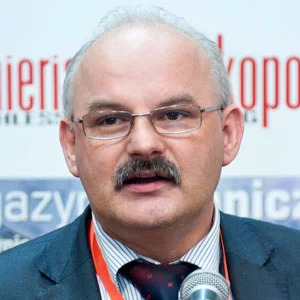
Dr.-Ing. Dariusz Zwierzchowski
Building expertise surveys
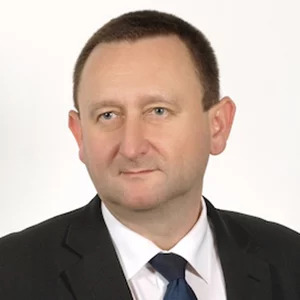
Dr.- Ing. Paweł Popielski
Possibilities of using the observation method and digital twins during the operation of critical infrastructure and the implementation of trenchless techniques
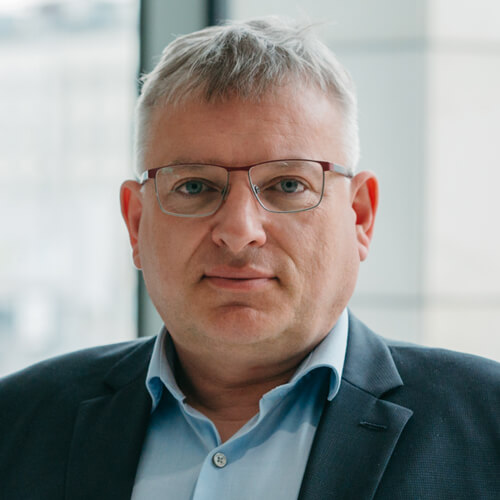
Tomasz Szczepański
Inventory of the Current Technical Condition of Infrastructure Facilities. 3D Scanning Technology – Capabilities and Limitations
Traditional on-site surveys require precise work under specific conditions, are time-consuming, and may be challenging to perform. Laser scanning technology and the generation of point clouds offer a way to support this process using modern measurement instruments and IT solutions.
This presentation is not intended to promote any specific product or manufacturer, but rather to showcase practical engineering applications. Therefore, real-life examples of 3D scanning usage in the water and wastewater sector will be presented, along with a discussion of the actual capabilities of this technology.
We will explore how 3D scanning can be useful and—equally importantly—what its limitations are. In addition to its obvious use during the planning phase of rehabilitation projects, the technology can also be employed to document construction progress and as part of as-built documentation.
As such, it is a tool of interest not only to investors and network operators but also to designers and contractors. 
Mariusz Iwanejko
5 technologies - trenchless renovation of the Żerań Collector in Warsaw

Marcin Ficenes
Renovation of more than 100 years old sewer infrastructure using segments integrated into the drought flume - a case study from Düsseldorf
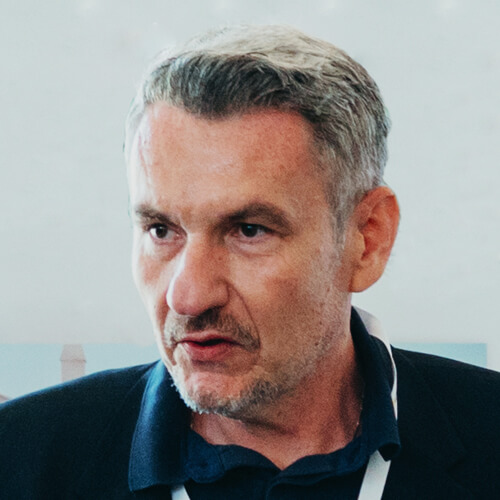
Jacek Kulig
Rehabilitation of gravity sewers with PP-HM pipe modules
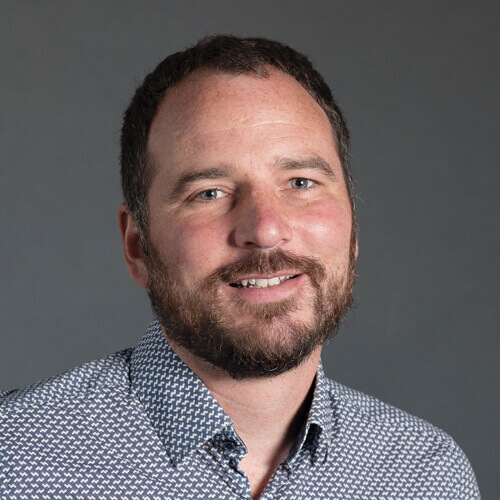
Otakar Cigler
Primus Line - Practical experience in the rehabilitation of water mains along curves of 500 m or more

Paweł Kośmider
Investment preparation and selection of trenchless technologies in the area of trenchless rehabilitation
PANEL DISCUSSION
Speakers:

Paweł Kośmider
PARTICIPANTS:
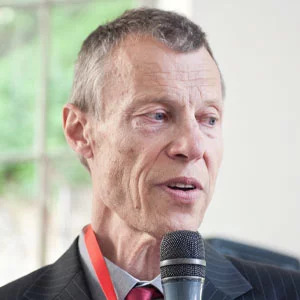
Dr.-Ing. Andrzej Kolonko
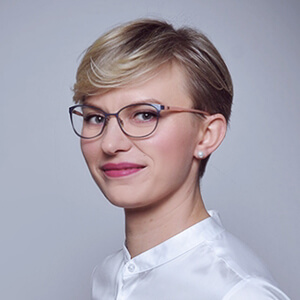
Dr.-Ing. Beata Nienartowicz

Dr.-Ing. Florian Piechurski

Dr.- Ing. Paweł Popielski

Dr.-Ing. Bogdan Przybyła
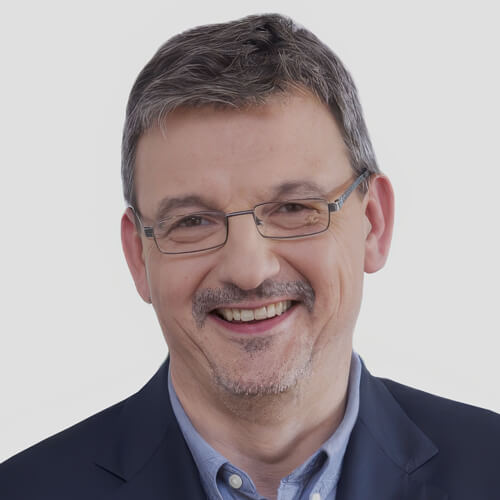
Jacek Tomczyk

Prof. Dr.- Ing. Adam Wysokowski

Dr.-Ing. Dariusz Zwierzchowski
Orangery
14:45 – 15:45
Lunch break
Orangery, Granary
15:45 – 17:30
Technology shows
AKWA and IBAK will be showcasing MicroGator Air, a state-of-the-art pneumatic milling robot. MicroGator Air is a state-of-the-art pneumatic milling robot designed to work in main ducts with diameters from DN200 to DN800. It has been fully integrated into the modular IBAK MainLite system, making it an extremely flexible and efficient solution for both rehabilitation and inspection work. 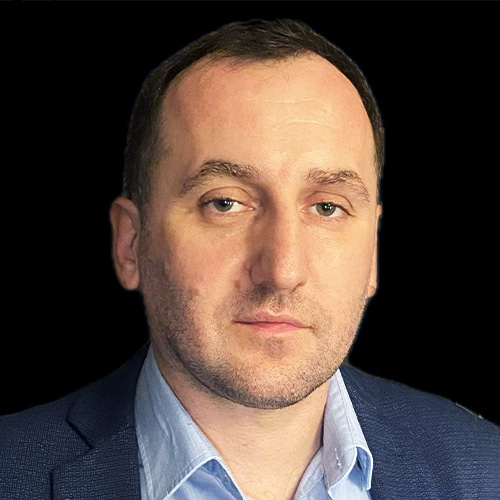
Łukasz Siąkała
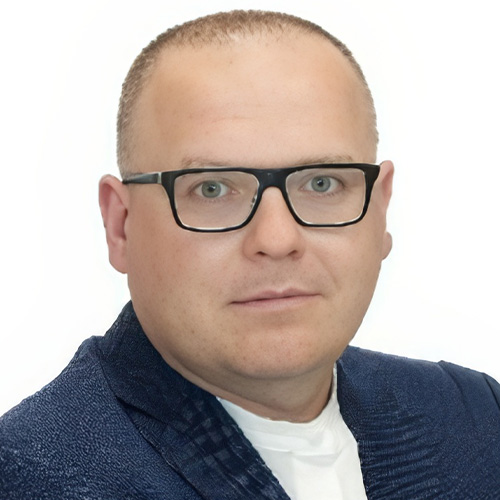
Damian Źrebiec
Live demonstration of scrubbers and ‘Mini Mud School’ measurements and how to control the solid phase in HDD
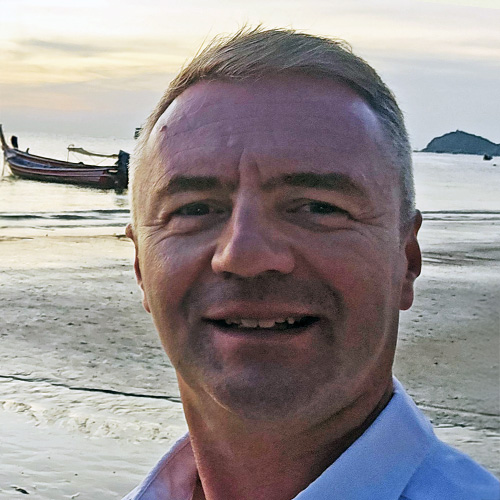
Grzegorz Owczarek
IBAK MicroGator Air - the versatile duct milling robot
The device features:
- modular design for rapid configuration and expansion,
- can be operated as a mobile system (e.g. on a construction site) or built into a service vehicle,
- Compatible with IBAK camera trolleys (T66 and T76) and ORION/ORPHEUS cameras,
- CutterCam precision camera with lens cleaning function and 4th axis for a greater range of manoeuvres.
MicroGator Air can support adapters for:
- milling and sludge cleaning with a high-pressure nozzle (UHP - up to 2,500 bar),
- installation of pacers for cap and flange seals.
By integrating with IKAS evolution software, it is possible to carry out the complete process - from inspection to repair planning to documentation of the work carried out - in one consistent system.
An important component of the unit is the UHP (Falch) adaptor with rotating cleaning nozzle combining two optimal procedures that open up new possibilities for the controlled and effective removal of persistent sludge from sewers on a large scale.
Jan Przybyła
UV LED technology demonstration - application of Sewertronics SpeedyLight+ technology on sewer connections using a felt sleeve and main sewers using a fibreglass sleeve
Plein air
20:30 – 3:00
Gala ceremony, TYTAN 2025 awards

During the gala also:
– gala dinner
– musical entertainment
– saxophone and violin concert
Orangery
10:00 – 13:00
Technical trip
Cruise on the Vistula
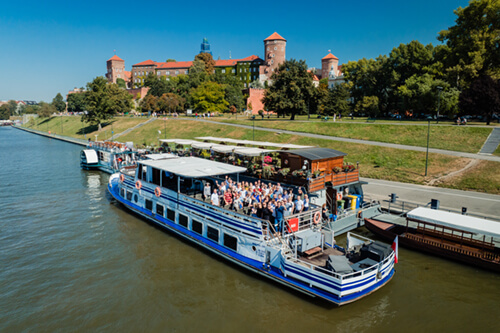
Trip

